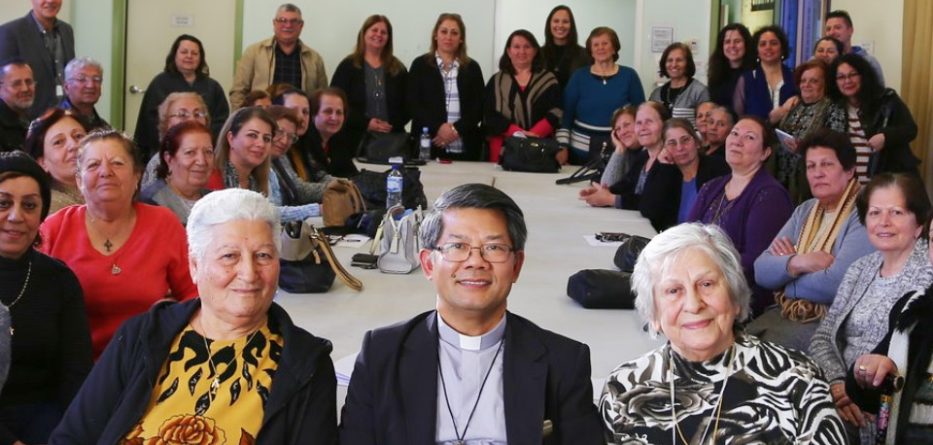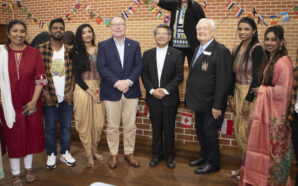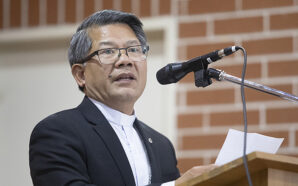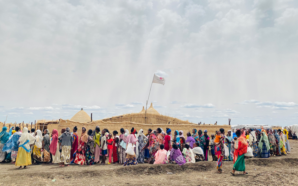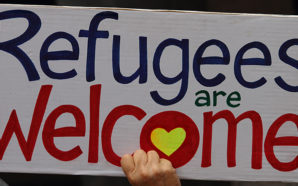Concern for migrants and refugees has been a key theme of Pope Francis’ pontificate – both in word and in action. His first pastoral visit outside of Rome as Pope was to the Italian island of Lampedusa. It is the entry point to Europe for many asylum-seekers and migrants arriving by boat without authorisation, seeking safety and a better life.
There Francis lamented the globalisation of indifference to the suffering of our sisters and brothers. He cared more about their suffering than their legal status. More recently, in his encyclical letter, On Fraternity and Social Friendship, Francis described a lack of respect for human dignity at borders as a “dark cloud over a closed world”. He called instead for open societies that welcome and include everyone in need or in search of a better life.
Francis believes that we can emerge from this pandemic better than before if we act with awareness that we are one family. The pandemic reminds us that no matter how we arrived in a community, we are all in the same boat. The truth is that no one can be saved alone. We can take this historic opportunity to rebuild better, greener and with greater inclusion. That knowledge equips us to avoid both excessive individualism and the aggressive populism that thrives on identifying enemies at home and abroad. “Fraternity,” the pope insists, “is the new frontier”, capable of knitting together the often competing demands of liberty and equality.
Of course, during a pandemic, we cannot always keep our borders open; we can, though, keep our hearts and minds open to the whole world. In fact, pandemic-induced border closures have shown us how much Australians benefit from freedom of movement, and how much migrants contribute to our society and economy. As we miss our freedom to travel, let us think of people whose movement is not so freely chosen.
At present, around 7,000 people who have already been assessed as requiring protection, and granted a visa under the offshore humanitarian program, are currently unable to travel to safety in Australia. Nor are there effective pathways to reach Australia, even with authorisation, to apply for asylum onshore. Asylum-seekers and refugees already in Australia also face challenges.
Department of Home Affairs statistics show that, as of 30 April 2021, the average length of detention for the 1,497 people in immigration detention was 646 days. This is higher than ever before. This figure includes some people who have committed serious crimes and who will be returned to their country of citizenship. But it also includes a growing number of people who are in complex situations. Some of them may not be eligible for refugee status but can never be safely returned to their country of origin, yet they pose low levels of risk to the community.
We need to find better ways to resolve their situations. As a community, we should not rush to judgement, presuming that anyone who does not meet the strict Refugee Convention definition of a refugee has no legitimate moral claim on our assistance at all. The reality of contemporary flows of human movement are far more complex than that, and our policy framework needs to evolve to address such situations more effectively, rather than leaving so many people with complex cases to languish in detention, or to appeal to ministerial discretion. It is not simple, but it is also not impossible.
The Catholic Church will always defend human life. Anyone who is forced to flee to protect their lives or human dignity has a moral claim on our assistance, whether they are a Convention refugee or not. It is what we would want from others if we were in their place.
With the average length of detention in Australia now at an historic high, it is timely to review how immigration detention is used. It should be a last resort that is used for the shortest practicable time so that people who pose little risk to the community are not unnecessarily deprived of their liberty, and that they are able to contribute to the community.
This is not naïve or impractical; Canada’s average length of detention in 2019-2020 was just 13.9 days. Imagine the human and financial costs that could be avoided if our average length of immigration detention was two weeks?
We already have working alternatives to detention. Community detention arrangements and release into the community on Bridging Visa E could be used more extensively. In this regard, the release of the Murugappan family from detention on Christmas Island is a welcome development. International experience may also suggest other workable alternatives to immigration detention.
Migrants and refugees need support to settle into their new home. Here, both the community and Government have a role to play. In an example that is close to home for me, the experience of the Vietnamese boat people provides clear evidence that even a highly traumatised group can be integrated in our multicultural society and can make a positive contribution. The fear that our social cohesion might be undermined by newcomers has been proven unfounded again and again by successive waves of migrants and refugees. By embracing new arrivals, Australia has evolved to become a much more dynamic, diverse and prosperous nation.
The Catholic community, through its various organisations and structures, is very active in visiting people in immigration detention, and in supporting asylum-seekers and refugees in the community. Those who are on bridging visas or temporary visas are not eligible for a range of government supports for people facing economic hardship due to the pandemic. Along with other charities and community-based organisations, we are working hard to assist these vulnerable people.
We are ready to work with governments to welcome and include many more of the world’s displaced people. We experience asylum-seekers, migrants and refugees not as an imposition or problem to be solved, but as sisters and brothers to be welcomed, protected, included and promoted.
Our encounter with asylum-seekers migrants, and refugees enriches our lives and provides us with an opportunity to work together for a better world. Their initiative, resilience and creativity make Australia a better place.
As Pope Francis says in his message for Migrant and Refugee Sunday this year – “they” make “us” a greater “we”. There are no longer “others”, but only a “we” as wide as humanity.
Bishop Vincent Long Van Nguyen OFM Conv STL DD is the Catholic Bishop of the Parramatta Diocese in Western Sydney and Chair of the Bishops Commission for Social Justice, Mission and Service within the Australian Catholic Bishops Conference.




